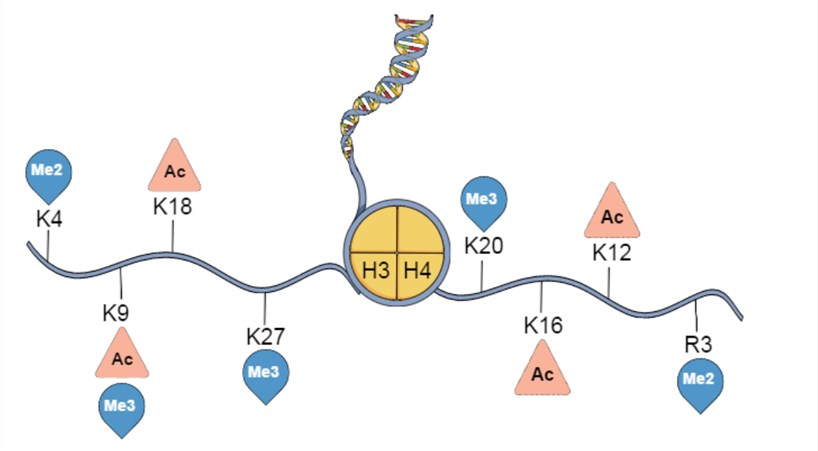Novel biomarkers are required for early cancer diagnosis, monitoring of prognosis, and optimization of chemo/radiotherapy treatment regimes. Epigenetic mutations take place at the earliest stages of tumorigenesis and therefore offer new approaches for detecting and diagnosing disease. As a trusted partner to pharmaceutical companies for a full range of in vitro diagnostic (IVD) antibody development services, Creative Biolabs offers high-quality antibodies as well as customized development services targeting nucleosomes.
Introduction of Nucleosomes
Nucleosomes are complexes of histone proteins and associated nucleic acids. A nucleosome consists of an octamer of the four highly conserved core histone proteins (H3, H4, H2A, H2B), joined together by a linker histone H1 with 146 base pairs of DNA wrapped nearly twice around the octamer. The nucleosome is fundamental to DNA structure and gene regulation. Individual histones can display a diverse array of post-translational modifications (PTMs). During the development of cancer, histones and the DNA within the nucleosomes are both altered and accumulating evidence indicates that these changes occur early in tumorigenesis. Increased levels of circulating nucleosomes have been associated with tumor burden and malignant progression in several types of cancers, including lung, breast, colorectal, and prostate cancer. Specifically, these epigenetic changes including but not limited to:
- Nucleosome-associated histone modifications (e.g., H4K20me3, H4PanAc, pH2AX, H3K9Me3, H2AK119Ub, H3K9Ac)
- Nucleosome-associated DNA modifications (e.g., 5mC)
- Nucleosome containing histone variants (e.g., H2AZ)
- Nucleosome-protein adducts (e.g., HMGB1, EZH2)
 Fig.1 Key breast cancer-associated modifications on H3 and H4. (McAnena, P., 2017)
Fig.1 Key breast cancer-associated modifications on H3 and H4. (McAnena, P., 2017)
Nucleosome Marker for Cancer Diagnosis
Utilizing circulating nucleosomes as biomarkers is an exciting new area of research that promises to allow both the early detection of cancer and monitoring of treatment response. It has shown several advantages such as:
- A rich variety of potential epigenetic alterations available, which allows fine-tuning of diagnostic sensitivity and specificity
- Circulation cell-free nucleosome level measurement offers a potential non-invasive approach to early cancer diagnosis
- Detection of serum nucleosomes using ELISA tests is easy to perform with small volumes of serum samples
- Nucleosome-based markers can be combined with other biomarkers to increase specificity and sensitivity of current tests
IVD Antibody Development Service for Nucleosome-Associated Markers
Because quantification of cancer-associated alterations in cell-free nucleosome-bound histone and DNA modifications as well as histone variants and other nucleosome-based markers could be attractive to help early detection of cancer and to help provide individualized precision-medicine based treatments for patients. Creative Biolabs, aiming to prompt the development of blood-based diagnostic and prognostic tests, offers high-quality IVD antibody development services targeting these nucleosome-related modifications and variants. Moreover, we also offer immunoassay and kit development services for both research and diagnostic uses.
Creative Biolabs integrates the expertise of antibody development as well as diagnostics and device manufacturers. We can supply a comprehensive range of products and services covering all areas of human diseases. Contact us to discuss your project and experience the great value of our services.
Reference
- McAnena, P., (2017). “Circulating nucleosomes and nucleosome modifications as biomarkers in cancer.” Cancers, 9(1), 5.
For Research Use Only.